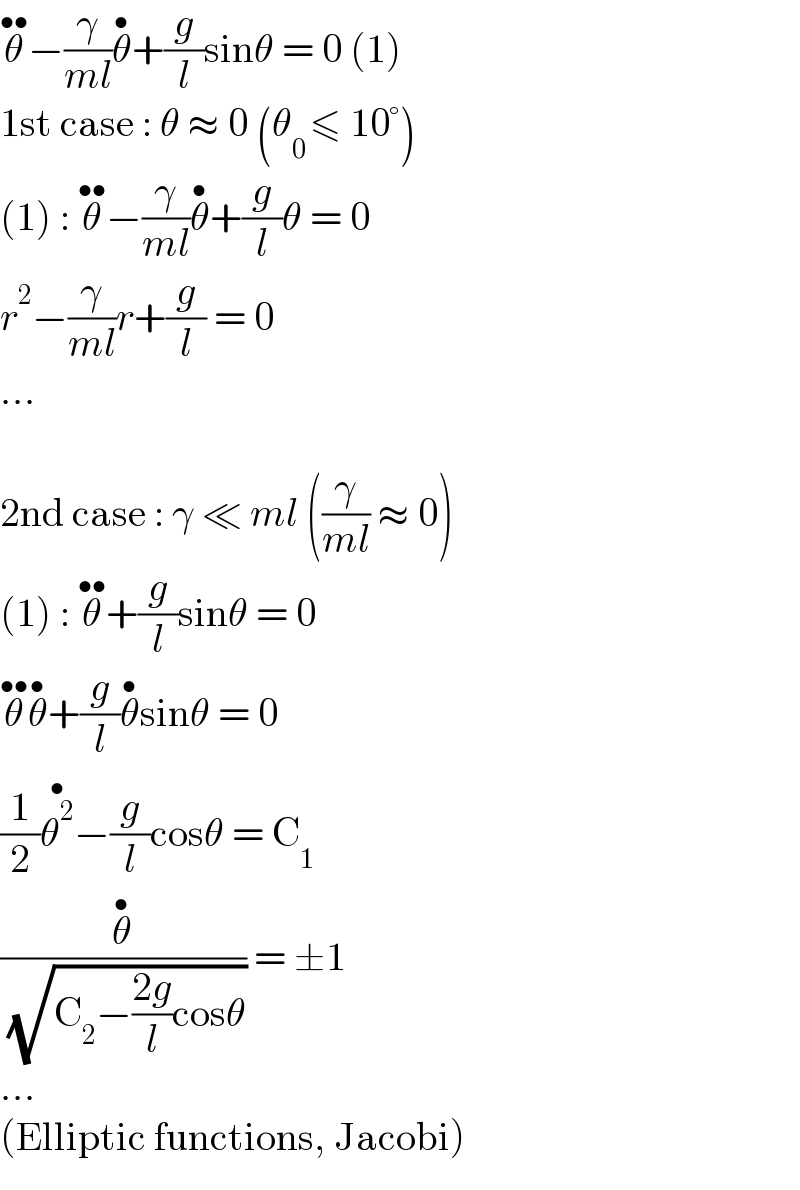Question Number 129985 by Dwaipayan Shikari last updated on 21/Jan/21

$$\overset{\bullet\bullet} {\theta}\left({t}\right)−\frac{\gamma}{{ml}}\overset{\bullet} {\theta}\left({t}\right)+\frac{{g}}{{l}}{sin}\theta\left({t}\right)=\mathrm{0} \\ $$
Answered by Olaf last updated on 21/Jan/21

$$\overset{\bullet\bullet} {\theta}−\frac{\gamma}{{ml}}\overset{\bullet} {\theta}+\frac{{g}}{{l}}\mathrm{sin}\theta\:=\:\mathrm{0}\:\left(\mathrm{1}\right) \\ $$$$\mathrm{1st}\:\mathrm{case}\::\:\theta\:\approx\:\mathrm{0}\:\left(\theta_{\mathrm{0}\:} \leqslant\:\mathrm{10}°\right) \\ $$$$\left(\mathrm{1}\right)\::\:\overset{\bullet\bullet} {\theta}−\frac{\gamma}{{ml}}\overset{\bullet} {\theta}+\frac{{g}}{{l}}\theta\:=\:\mathrm{0} \\ $$$${r}^{\mathrm{2}} −\frac{\gamma}{{ml}}{r}+\frac{{g}}{{l}}\:=\:\mathrm{0} \\ $$$$… \\ $$$$ \\ $$$$\mathrm{2nd}\:\mathrm{case}\::\:\gamma\:\ll\:{ml}\:\left(\frac{\gamma}{{ml}}\:\approx\:\mathrm{0}\right) \\ $$$$\left(\mathrm{1}\right)\::\:\overset{\bullet\bullet} {\theta}+\frac{{g}}{{l}}\mathrm{sin}\theta\:=\:\mathrm{0} \\ $$$$\overset{\bullet\bullet} {\theta}\overset{\bullet} {\theta}+\frac{{g}}{{l}}\overset{\bullet} {\theta}\mathrm{sin}\theta\:=\:\mathrm{0} \\ $$$$\frac{\mathrm{1}}{\mathrm{2}}\overset{\bullet} {\theta^{\mathrm{2}} }−\frac{{g}}{{l}}\mathrm{cos}\theta\:=\:\mathrm{C}_{\mathrm{1}} \\ $$$$\frac{\overset{\bullet} {\theta}}{\:\sqrt{\mathrm{C}_{\mathrm{2}} −\frac{\mathrm{2}{g}}{{l}}\mathrm{cos}\theta}}\:=\:\pm\mathrm{1} \\ $$$$… \\ $$$$\left(\mathrm{Elliptic}\:\mathrm{functions},\:\mathrm{Jacobi}\right) \\ $$
Commented by Dwaipayan Shikari last updated on 21/Jan/21

$${Is}\:{it}\:{possible}\:{to}\:{solve}\:{it}\:{simaltaneously}? \\ $$$${Including}\:\:\frac{\gamma}{{ml}}\overset{\bullet} {\theta}\:{and}\:\frac{{g}}{{l}}{sin}\theta\:\:\:? \\ $$
